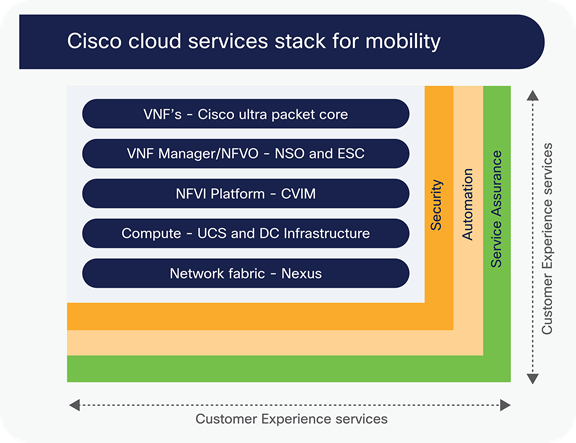Cisco Cloud Services Stack for Mobility At-a-Glance
Available Languages
Bias-Free Language
The documentation set for this product strives to use bias-free language. For the purposes of this documentation set, bias-free is defined as language that does not imply discrimination based on age, disability, gender, racial identity, ethnic identity, sexual orientation, socioeconomic status, and intersectionality. Exceptions may be present in the documentation due to language that is hardcoded in the user interfaces of the product software, language used based on RFP documentation, or language that is used by a referenced third-party product. Learn more about how Cisco is using Inclusive Language.
Mobile network virtualization and industry impediments
Mobile operators are focused on virtualizing their packet core deployments to deliver new mobile services to market faster, and Network Function Virtualization and Service Provider (SP) Private Cloud, also known as Telco Cloud, are key enablers for making this possible. According to Global Industry Analysts, Inc., the worldwide market for NFV will grow at a CAGR of 20.7%, reaching US$48.5 billion by 2026.
However, the initial NFV promise of simplicity and plug and play to deliver ease of use, cost-efficiency and scale has not been realized by many vendors. Many Service Providers (SPs) have rushed to develop networks based on NFV comprising best-in-class and disparate technology stacks. While a few have had success building SP Private Clouds, these projects require substantial skillsets and budgets, often not easily available to majority of providers. Additionally, they have struggled to define, integrate and regression test their best-of-breed stacks, leading to increased integration costs, recurring interoperability issues and heightened security risk. As service providers deployed disaggregated, virtualized mobile core solutions, Cisco observed that interoperability testing proved to be extremely time-consuming, and the high costs of integration were a significant area of concern. Indeed, the industry is again finding these same issues with Telco Cloud and Open RAN1.
● Accelerate implementation and innovation of mobility services by standardizing the infrastructure, leveraging economies of scale and avoiding the challenges of unique stacks.
● Speed deployment of the market-leading Packet Core solution, based on carrier grade NFVI, award-winning automation/ orchestration, industry-recognized hardware/software components, and embedded security.
● Simplify design and procurement through a pre-tested and pre-validated horizontal, carrier-grade NFVI platform for Telco Cloud/ NFVI, based on years of Cisco experience.
● Reduce cost of integration by leveraging Cisco’s investment in pre-design and pre-validation testing of best-in-class stack components.
● Optimize post-deployment operations and accelerate issue resolution through single point of contact for all technical support for all components within the stack.
● Minimize risk by leveraging Cisco’s investment in security penetration testing, and large scale performance validation.
Accelerate new mobility services
Mobile Core Deployments
Cisco Cloud Services Stack for Mobility is a private cloud-based mobile packet core solution that helps accelerate implementation and innovation of mobility services. It offers a complete and open, vertical or horizontal infrastructure stack, formally designed by Cisco Customer Experience (CX). It is integrated with multiple Virtual Network Functions (VNFs) which are pre-validated through Cisco testing, and embedded with hardened security, automation and assurance. These capabilities help reduce spiraling integration costs and overall networking complexity.
Cisco Cloud Services Stack for Mobility has been built based upon the years of Cisco experience, services expertise, best practices, and networking insights our experts have gained from engagement with some of the world’s leading telecom companies such as T-Mobile and Rakuten, and is fully supported by a primary point-of-contact through Cisco Solution Support.
Cisco Cloud Services Stack for Mobility enables faster rollout of new services by utilizing industry leading capabilities, mobile packet core software, and extensive Cisco experience and insights, leveraging:
● Cisco’s market-leading Ultra Packet Core, deployed in the world’s largest and most challenging mobile networks, using carrier-grade virtualization platform, Cisco Virtual Infrastructure Manager (CVIM)
● Award-winning automation and orchestration product, Cisco Network Service Orchestrator (NSO)
● Virtual Network Function (VNF) Manager with Cisco Elastic Services Controller (ESC)
● A sophisticated compute platform based upon Cisco Unified Computing System (UCS)
● Advanced data center fabric using Cisco Nexus
CX customization services provide service providers with expansion options such as onboarding new capabilities with Cisco-certified customer/third-party VNFs, or assistance with workflow configurations
Cisco Solution Support centralizes technical support across solution hardware and software, resolving complex issues 44% faster than product support2.
Optional High or Dedicated Touch Technical Support (HTTS, DTTS)
Optional Solution Validation Services for ongoing testing, design and validation capabilities

Private cloud-based mobile packet core solution accelerates time-to-market of new mobility services
For more information, contact your Cisco representative.